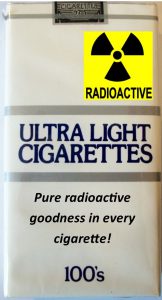Polonium-210 is not typically part of everyday conversation. No one has ever gone to a dinner party and said, “Hey, so what’s everyone’s thoughts on Polonium-210?” Most likely, that would be their last dinner party.

Yet, this chemical is pervasive and found everywhere in the soil and air. So, you might think, well if it’s everywhere, then it must be safe. And in normal day to day life, you would be right, as the levels are typically so low it’s harmless.
But Polonium-210 is a radioactive chemical. It’s a byproduct of the decay of radon gas. (It’s the same poison the Russian spy agency, FSB, mixed into the tea of former KGB agent turned businessman Alexander Litvinenko in 2006.) *
Because it is in the ground and air, all plants naturally contain a certain amount of Polonium-210. But before you use this knowledge as a great excuse to avoid broccoli, the fact is, the levels of this substance in most plants are far too low to hurt anyone…except, that is, in some broad-leaf plants such as tobacco.
The chemical can build up in tobacco leaves and it does not dissipate when the leaf is cut, dried or rolled into cigarettes.
By lighting up and inhaling, a small amount of this radioactive chemical easily finds its way into your body. Polonium-210 can concentrate in the liver, kidneys, spleen and other internal organs. This can cause radiation exposure. Over time, the buildup can result in serious medical conditions including various forms of cancer.
There are over 4,000 toxic chemicals in most every cigarette. Polonium-210 is only one of those chemicals. It’s not a substance very many people know about, but maybe if we did know more, that could be enough incentive for someone to quit smoking, or better yet, not start in the first place.
Now that I think about it, instead of discussing a cool new Netflix series or recent pictures of another starlet caught topless, maybe the world would be a little better off, if at least occasionally, our dinner party conversation included a discussion about Polonium-210.
By Phil Berbig
For more information go to: //www.who.int/news-room/fact-sheets/detail/tobacco
* //www.theguardian.com/world/2018/mar/06/poisoned-umbrellas-and-polonium-russian-linked-uk-deaths
